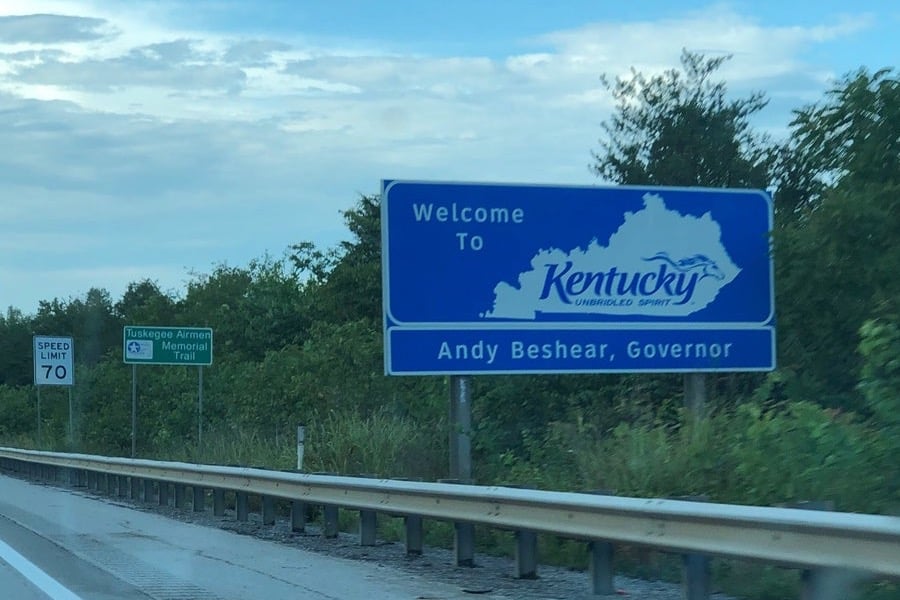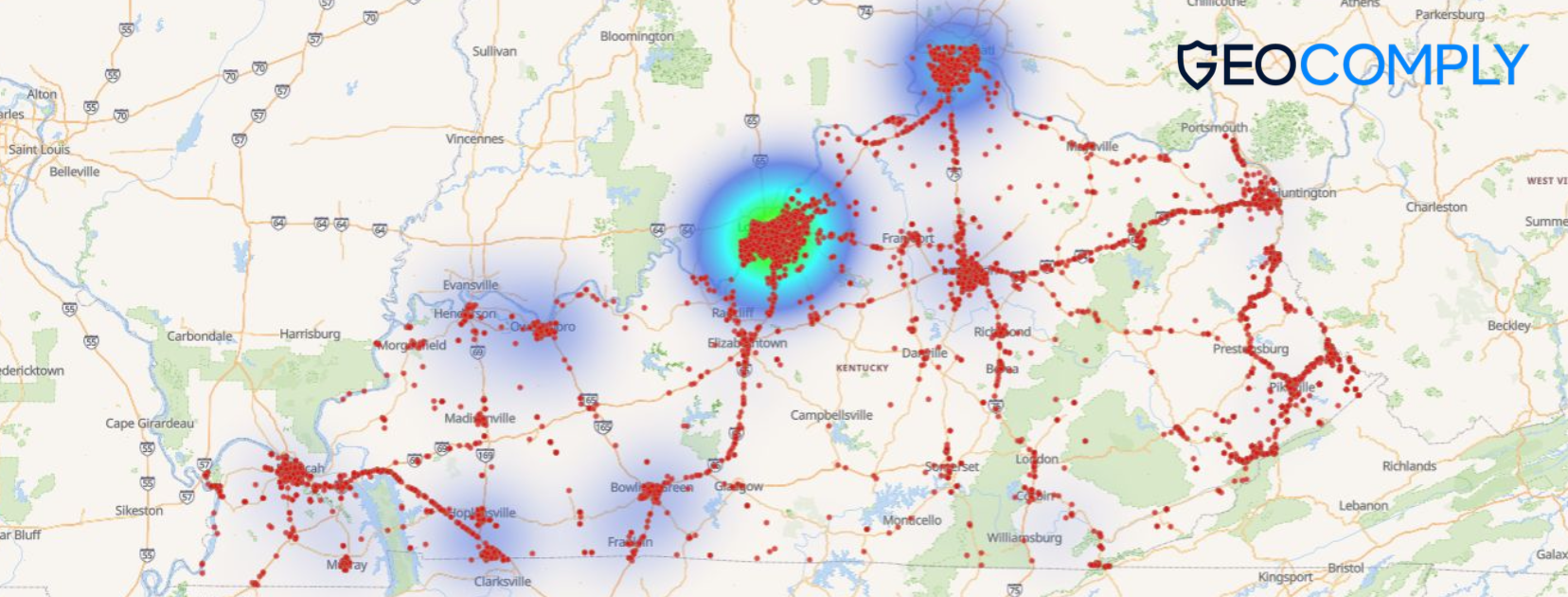Kentucky Sports Betting Update: 530K Attempts In State Reported Blocked
Posted on: April 11, 2022, 10:58h.
Last updated on: April 13, 2022, 10:21h.
Data from GeoComply provided to Casino.org shows the IT vendor to mobile sports betting operators blocked more than a half-million “geolocation transactions” from people in Kentucky trying to access a mobile sportsbook in another state over a recent 30-day period.

Geolocation transactions aren’t always tied to bets. Still, the Vancouver-based company that provides geofencing services to sportsbooks has indicated in the past that they are an indicator of wagering activity. Sportsbooks use companies like GeoComply to ensure all bets they receive are placed within the state or jurisdiction that has legalized sports betting.
The information comes as Kentucky legislators prepare to end the 2022 General Assembly session. House Bill 606, which would legalize sports betting, sits in the Senate. However, it needs successful votes in both a committee and the floor to get to Gov. Andy Beshear, a bill proponent. State Rep. Adam Koenig, the Erlanger Republican who is the primary sponsor of HB606, is using the information from GeoComply to persuade senators to make Kentucky the 34th state to legalize the gaming activity.
Koenig told Casino.org that the GeoComply data is part of the presentation he gives to demonstrate why legalizing sports betting would be a good policy for Kentucky.
41,000 Unique Accounts Identified
During the recent one-month period, the company told Casino.org that it blocked about 532,000 transactions. It’s highly likely that number would have been substantially higher had the Kentucky Wildcats not suffered a historic first-round upset in this year’s NCAA Tournament.
GeoComply’s research found that 85 percent of those transactions were from people trying to obtain access to sportsbooks available in Indiana, Tennessee, and Virginia. Those are three of the five states surrounding Kentucky that have licensed sportsbooks, with Illinois and West Virginia being the other states – and the map shows there are dots near those borders as well.
Seven states surround Kentucky. A sixth, Ohio, passed sports betting legislation late last year and is in the process of reviewing regulations and public feedback. The other state is Missouri, which is also considering legalizing sports betting this year.
The data also showed roughly 41,000 unique accounts that GeoComply pinpointed in Kentucky. That’s close to the population of Covington, Kentucky’s fifth-largest city. It’s also roughly equivalent to 1.1% of the adult population in the state. For comparative purposes, when sports betting launched in Louisiana in late January, the number of unique users active in the first 36 hours was approximately 3.6% of its adult population.
Keep in mind, that’s just the number of accounts identified during the 30 days. It also does not include Kentuckians who did not access their accounts until they crossed over into a state where sports betting is legal.

Attempts Made Across Kentucky
The information from GeoComply tends to show what many proponents have touted – that there is significant interest in sports betting in Kentucky. The company’s data does not include any illegal wagering activity made through local bookies or unregulated offshore sportsbooks.
The red dots stretch across a state map of Kentucky. In some ways, it looks like a traffic or construction map. Instead, each one of those dots represents a geolocation transaction. The clumps are noticeable in the state’s population centers. Not just in Louisville, Lexington, or Northern Kentucky, but places across the state like Bowling Green, Owensboro, Paducah, and Pikeville.
There are also dots scattered across the state in some of its rural areas, such as Western Kentucky and the state’s northeastern corner.
A representative for GeoComply told Casino.org the only statutory requirement for geolocation tracking is in the stage before a wager is placed. However, some of the IT firm’s clients seek additional checks, such as when an account holder signs in to their account.
The 532,000 geolocation attempts blocked over the 30 days represent a fraction of what legal states see in a day. Going back to Louisiana, GeoComply tracked more than 3.4 million such transactions during the first two-and-a-half days of legal sports betting. Of course, most of those transactions were not blocked, meaning account holders were free to stay on their accounts, place wagers, and check their activity.
Kentucky Sports Bet Bill Enters Crucial Stretch
The Kentucky General Assembly will reconvene Wednesday for the final two days of its annual session. While the main focus will be on voting to overturn vetoes issued by Beshear, there will be time to work on other legislation. That’s mainly why HB 606 received readings in the Senate before it recessed, allowing Koenig to meet with senators during the recess and lobby them to support it.
Majority Floor Leader Damon Thayer, R-Georgetown, is a staunch bill supporter. While he considers it a longshot to pass this week, he added that senate leaders would take a “temperature read” to determine if the votes were there to move it along.
Next 48 hours are big,” Koenig told Casino.org on Monday. “My guess is the Senate is going to have a pretty good idea of their plans by lunch Wednesday.”
If HB 606 were to pass, it would allow the state’s race tracks to offer sports betting through retail sportsbooks and online wagering apps. The retail locations would be tied to the tracks and a satellite facility, which is a separate historical horse racing parlor located within 60 miles of the licensed track. Sportsbooks would be taxed at 9.75% of their revenues at brick-and-mortar facilities and 14.25% of their revenues from online wagers.
In addition to sports betting, HB 606 would also legalize online poker and regulate fantasy sports.
Related News Articles
Insiders Say No-Go on Florida Sports Betting This Year
Most Popular
Mirage Las Vegas Demolition to Start Next Week, Atrium a Goner
Where All the Mirage Relics Will Go
Most Commented
-
Bally’s Facing Five Months of Daily Demolition for Chicago Casino
— June 18, 2024 — 12 Comments -
Chicago Pension Mess Highlights Need for Bally’s Casino
— July 2, 2024 — 5 Comments
















No comments yet